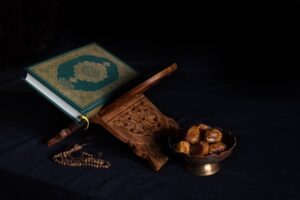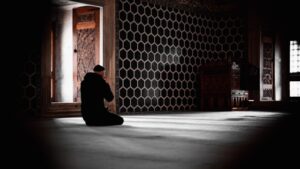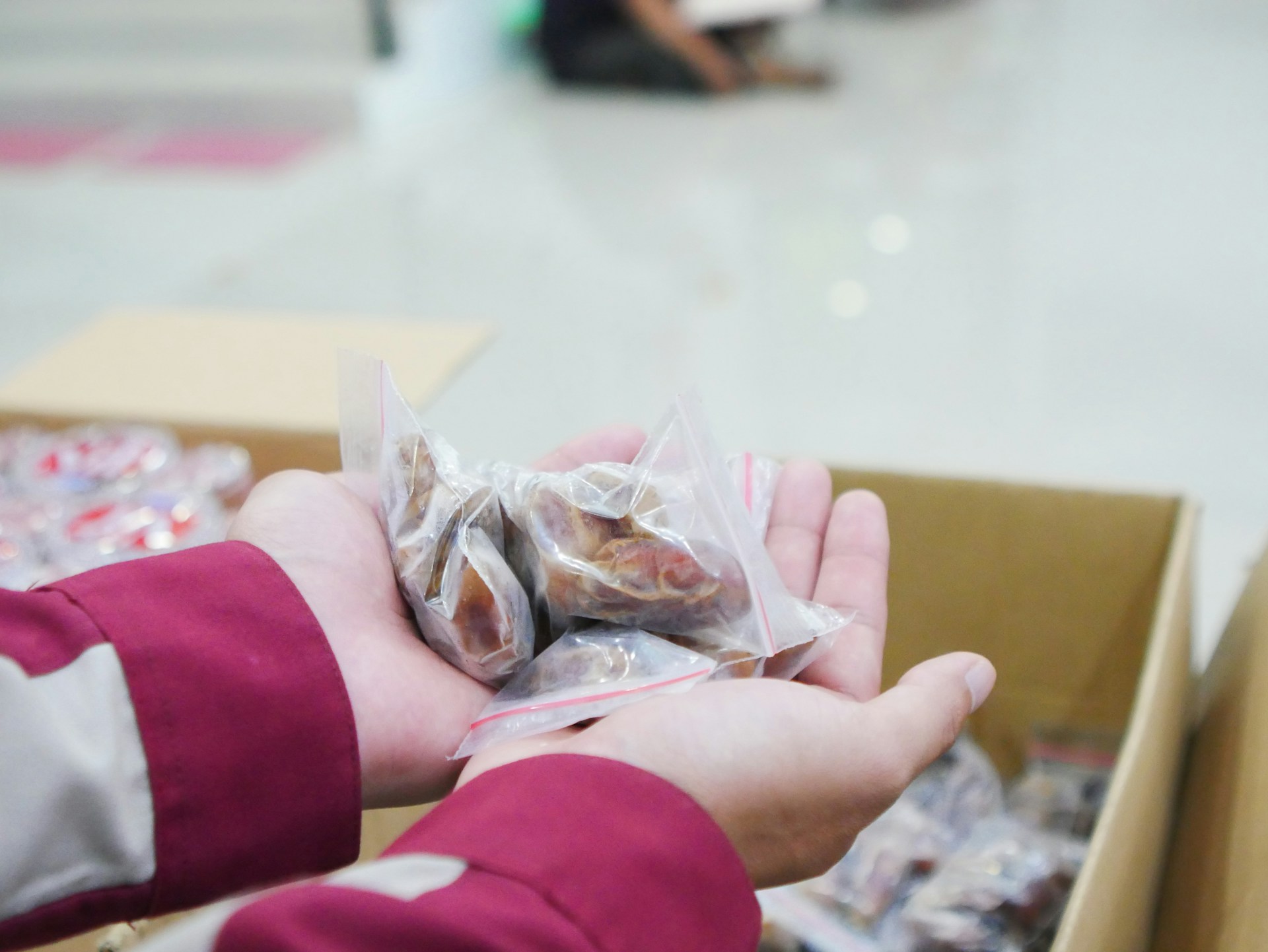As the sun dips below the horizon and the day’s fast draws close, Muslims worldwide prepare for the Iftar meal—a moment of significant spiritual reflection and personal supplication.
The act of breaking the fast, or Iftar, is not only a physical replenishment but also a profound spiritual reconnection.
Central to this sacred moment is the Dua (prayer) for breaking the fast, a simple yet powerful supplication that resonates with deep gratitude and humble petitioning.
We’ll offer insights into its meanings, variations, and the profound impact it holds in the daily lives of the faithful during the holy month of Ramadan and beyond.
Join us as we delve into this cherished practice, understanding why it is more than just a ritualistic utterance but a profound communion with the divine.
Dua for Breaking a Fast in Ramadan

The Dua for breaking the fast during Ramadan, known as the Iftar Dua, is a special prayer recited by Muslims at sunset when ending their daily fast.
This Dua is an expression of thankfulness to Allah for the strength to complete the fast and a reminder of its spiritual purpose.
It emphasises reliance on God’s provisions, deepens the worshipper’s faith, and enhances the spiritual experience of Ramadan by linking fasting directly to divine worship and gratitude. Here is the recommended dua for breaking fasting:
Transliteration
Allahumma inni laka sumtu wa ala rizq-ika-aftartu
Translation
O Allah! For You, I have fasted and upon your provision, I have broken my fast.
Correct Way to Break Your Fast According to the Sunnah
According to the Sunnah, the traditional practice of the Prophet Muhammad, there are specific guidelines to follow when breaking the fast during Ramadan to ensure it aligns with these revered teachings of having meals after fasting:
- Timing: The fast should be broken immediately after sunset. Delaying the breaking of the fast is discouraged in the Sunnah. The Prophet Muhammad emphasised the importance of not delaying Iftar by stating,
- Breaking the Fast with Fresh Dates: The Sunnah recommends breaking the fast with fresh dates. If fresh dates are unavailable, dry dates should be used to open fasts. If neither is available, drinking water is recommended. This practice is based on the hadith in which the Prophet Muhammad said,
- Recitation of the Dua: Before eating or drinking when opening the fast, it is Sunnah to recite the dua for breaking the fast. The most common dua recited is
meaning,
Hadith scholars often cite this dua based on the practice of the Prophet (PBUH), though its specific origin isn’t directly attributed in primary hadith collections.
- Starting with a Small Amount: It is recommended to start with a small quantity of food and water before proceeding to the main meal. This practice helps prepare the digestive system for more substantial food after fasting.
- Performing Maghrib Prayer: After breaking the fast with dates and water and before eating the main meal, it is Sunnah who performs the Maghrib prayer. This ensures the prayer is on time and balances physical sustenance and spiritual nourishment.
Following these practices aligns with the teachings of the Prophet Muhammad and enhances the spiritual and physical benefits of fasting during Ramadan.
Why Is Dua Important During Ramadan?

Duas, or supplications, hold a particularly significant place during Ramadan for several reasons, intertwining spiritual practice with personal reflection and divine communication. Here are some of the key reasons why dua is emphasised during this holy month:
- Spiritual Connection: Ramadan is a time of heightened spirituality and devotion. Dua allows individuals to connect personally with Allah, expressing their innermost thoughts, fears, hopes, and gratitude. This personal communication reinforces their relationship with the divine, making it a crucial aspect of worship during Ramadan.
- Seeking Forgiveness: One of the core objectives of fasting in Ramadan is to seek forgiveness for past sins. Dua provides a means to ask Allah for forgiveness and mercy. It is believed that during Ramadan, especially during the nights of Qadr and when breaking fast, supplications are more likely to be accepted, as the gates of mercy are wide open.
- Spiritual Purification and Reflection: Ramadan is a time for self-evaluation and spiritual purification. Through dua, Muslims reflect on their deeds, seek guidance for the future, and ask for strength to abstain from sin. This introspection helps purify their hearts and renew their intentions.
- Increased Reward: The rewards for good deeds are believed to be multiplied during Ramadan. Making dua is an act of worship for which Muslims believe they are rewarded. Frequent supplication is thus seen as a way to maximise the spiritual benefits of Ramadan.
- Strengthening Patience and Perseverance: Ramadan teaches patience and perseverance through fasting. Dua supports these virtues by allowing individuals to verbalise their struggles and seek assistance overcoming them. It helps cultivate resilience and reliance on Allah.
- Fulfilment of Needs: During Ramadan, Muslims are encouraged to ask Allah for their needs and desires, both worldly and hereafter. It is a time when Allah is said to be especially close to His believers, listening to their pleas and responding to their calls.
- Night of Decree (Laylat al-Qadr): This night, better than a thousand months, is said to be hidden within the last ten nights of Ramadan. Supplications made this night are of immense significance, and it is highly recommended that you engage in extended prayers and dua, seeking the best from Allah.
Dau for Laylat-Al-Qadr
Laylat al-Qadr, also known as the Night of Decree or Night of Power, is considered the holiest night in the Islamic calendar.
It is traditionally celebrated on one of the last ten nights of Ramadan, particularly on the odd nights. It is believed to be the night when the Quran was first revealed to the Prophet Muhammad, making it a time of immense blessing and divine mercy.
During Laylat al-Qadr, Muslims engage in intensive worship, give zakat or charity, and feed the underprivileged, hungry, orphaned children, and displaced believers in pursuit of Allah’s favour and blessings.
A particularly significant Dua for Laylat al-Qadr is recommended by the Prophet Muhammad for those observing this night. He advised his wife, Aisha (RA), to recite the following:
Translated, this means:
This simple yet profound Dua encapsulates the essence of Laylat al-Qadr—seeking Allah’s forgiveness, mercy, and favour. It highlights Allah’s attributes of forgiving and loving forgiveness, making it a suitable supplication for a night that emphasises redemption and mercy. Muslims are encouraged to recite this Dua frequently throughout the night, engage in additional prayers, read the Quran, and perform other acts of worship.
Can I Brush My Teeth While Fasting?

Yes, you can brush your teeth while fasting during Ramadan. However, it’s important to be cautious and ensure that no water or toothpaste is swallowed during the process, as that could invalidate the fast.
Islamic scholars generally agree that maintaining oral hygiene, including using toothpaste and a toothbrush, does not break the fast as long as nothing is ingested.
This practice aligns with the Sunnah (traditions of the Prophet Muhammad), which encourages cleanliness and personal hygiene.
Many people prefer to brush their teeth outside of fasting hours, such as after Suhoor (a pre-dawn meal) and after Iftar (a meal to break the fast), to avoid the risk of accidentally swallowing something while fasting.
If you’re concerned about it or prefer an alternative, consider using a miswak. A miswak is a traditional natural tooth cleaning stick, used widely in the Muslim world and endorsed in the Sunnah as a tool for oral care that can be used without such concerns during fasting.
Does Swallowing Saliva Break Fast?
No, swallowing saliva does not break your fast. Swallowing saliva is a natural and unavoidable part of daily life, and Islamic teachings are practical.
The act of swallowing saliva is permissible during fasting in Ramadan and does not invalidate the fast.
Islamic scholars and jurisprudence confirm that only intentional eating or drinking breaks the fast.
Since saliva is naturally produced and swallowed without thought, it does not affect the validity of the fast. This view helps balance strict fasting observance and practical, reasonable living during the fasting hours.
Which Days Are Forbidden To Fast In Islam?
In Islam, while fasting is a highly valued practice, there are specific days when fasting is considered forbidden or highly discouraged. Here are those particular days:
- Eid al-Fitr: This is the festival marking the end of Ramadan. Fasting on the day of Eid al-Fitr is strictly prohibited, as it is designated for celebration, feasting, and gratitude after a month of fasting.
- Eid al-Adha: The day of Eid al-Adha and the three days that follow it, known as the days of Tashreeq (11th, 12th, and 13th of Dhul Hijjah), are also days on which fasting is prohibited. These days are meant for sacrifice and celebration in remembrance of the sacrifice of Prophet Ibrahim (Abraham).
- Days of Doubt: Fasting on the day when there is uncertainty, whether it is the last day of Sha’ban or the first day of Ramadan, is discouraged. This practice is based on the hadith that cautions against fasting on these days of doubt to avoid mistakenly fasting on a day that is actually part of Sha’ban.
These regulations help ensure that the special days of communal celebration and doubt are observed appropriately, maintaining the balance between worship and communal festivity as prescribed in Islamic teachings.
Can You Fast On a Friday?

Yes, you can fast on a Friday in Islam, but there are specific guidelines and recommendations.
The Prophet Muhammad advised Muslims against singling out Friday as a day for fasting unless it coincides with a regular fasting schedule or is part of a consecutive series of fasts.
Here are the key considerations regarding fasting on a Friday:
- Not Singling Out Friday: Fasting only on Friday is discouraged. If you choose to fast on a Friday, it is recommended to either fast the day before (Thursday) or the day after (Saturday). This recommendation aims to avoid elevating Friday (a weekly Eid or celebration day for Muslims) with additional acts of worship not specified by the Sunnah.
- Part of Regular Fasting: If Friday falls on a day that you usually fast, such as during Ramadan or as part of your regular voluntary fasting schedule (like fasting on Mondays and Thursdays), it is perfectly acceptable to fast.
- Special Occasions: Fasting on Fridays that coincide with special fasting days like Arafah or Ashura is also permissible and encouraged. These are exceptions because the fast is for the specific significance of those days, not because the day is Friday.
The guidance helps ensure that while personal acts of piety are maintained, communal norms and Friday’s unique weekly significance are respected.
Summary – Dua for breaking Fasting
In conclusion, reciting a Dua when breaking the fast during Ramadan is a cherished ritual that enhances the spiritual dimension of fasting.
This profound act of reciting Ramadan duas serves as a moment of thanking Allah for the sustenance and reinforces the worshipper’s connection to their faith. The Dua encapsulates fasting as an act of devotion, belief, and reliance on divine provision.
By integrating this supplication into the ritual of breaking the fast, Muslims affirm their commitment to their beliefs and gratitude towards Allah, making each iftar a physical nourishment and a spiritual reawakening that brings them closer to their lord.






